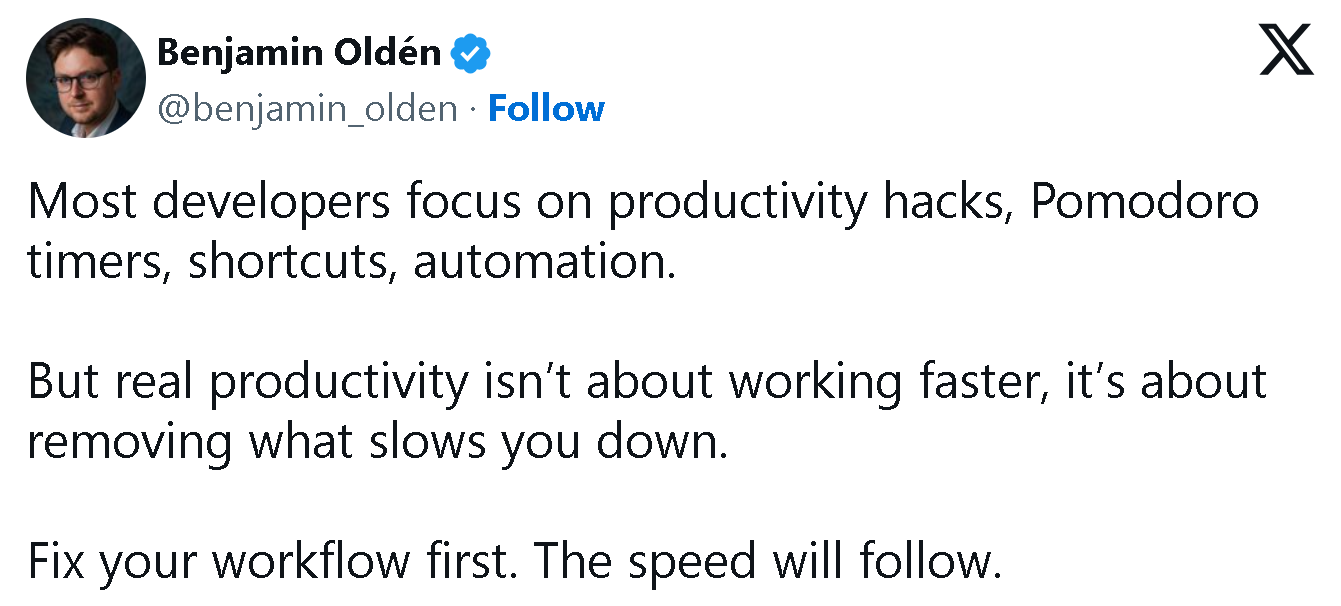How to Maximize Your Productivity as a Software Developer
Work smarter, write better code, and avoid burnout
Just scroll through any developer forum, and you’ll see the same productivity advice repeated over and over.
Use a Pomodoro timer.
Write better comments.
Take breaks.
Automate repetitive tasks.
Yes, those are all helpful tips. But the way most developers approach productivity is backward, they focus on tactics before fixing the real bottlenecks in their workflow.
Instead of optimizing the small things, the most productive developers structure their work differently.
They remove distractions, create deep work sessions, automate what doesn’t require thinking, and, most importantly, they code smarter, not just faster.
Why Most Developers Get It Wrong
The problem isn’t that productivity advice is bad. Of course, it’s important to have a well-configured IDE, take breaks, and use the right tools.
The problem is that productivity “hacks” don’t work if your workflow is fundamentally broken.
If you’re constantly context switching between tasks, a Pomodoro timer won’t save you.
If you spend hours debugging messy code, automating small tasks won’t make a difference.
If you’re stuck in meetings all day, keyboard shortcuts won’t make you more productive.
Productivity isn’t just about working faster, it’s about removing the things that slow you down.
A Different (and More Effective) Approach
So instead of asking, “How can I work faster?”, consider a better question:
What’s actually slowing me down?
This mindset shift changes everything. Instead of chasing surface-level productivity tricks, you can focus on fixing:
The way you structure your workday to maximize deep focus.
The processes you use to write and ship code efficiently.
The automation and AI tools that eliminate repetitive work.
Because when you remove friction, you don’t need hacks, you just become naturally productive.
What Actually Works
1. Protect Your Deep Work Time
Developers do their best work when they get long, uninterrupted focus sessions. But most workdays are full of distractions.
Meetings. Slack notifications. Context switching.
Instead of coding in short bursts, the best developers block off deep work time.
What works:
Batch meetings into specific time blocks instead of spreading them throughout the day.
Use “Do Not Disturb” mode on Slack, email, and notifications during coding sessions.
Work in 90-minute focus sprints with zero distractions.
Protect at least two deep work blocks per day where you code distraction-free.
2. Write Code That Saves Future You Time
Many developers optimize for writing code fast, but the real productivity boost comes from writing cleaner code that minimizes future bugs and rewrites.
What works:
Follow simple, readable coding patterns instead of over-engineering solutions.
Write self-explanatory code that doesn’t require excessive comments.
Refactor as you go instead of accumulating tech debt that slows down future work.
Before writing new code, ask: “Will this be easy to debug in six months?” If not, rethink the approach.
3. Automate Repetitive Tasks (But Only the Right Ones)
Most developers know automation is useful, but many waste time automating low-impact tasks instead of fixing bottlenecks.
What works:
Automate environment setup (dotfiles, Docker, scripts) to save setup time.
Use AI-assisted coding tools (GitHub Copilot, Cursor) to speed up boilerplate writing.
Create templates for recurring tasks (PR descriptions, commit messages).
Look at the tasks you repeat daily, find one to automate this week.
4. Reduce Context Switching & Multitasking
Switching between projects, debugging, meetings, and code reviews kills productivity because your brain constantly resets.
What works:
Group similar tasks together (e.g., batch all code reviews in one session).
Dedicate different days to different types of work (e.g., feature building vs. bug fixes).
Keep a “parking lot” for distractions, write down random ideas and revisit them later.
Track your distractions for one day, then create a plan to eliminate them.
5. Take Breaks to Avoid Burnout
The best developers don’t just optimize their work, they optimize their energy.
What works:
Take regular breaks (mental fatigue slows coding more than you realize).
Move around, a five-minute walk does more for focus than 30 minutes of scrolling.
Prioritize sleep, bad sleep makes even the best developers unproductive.
Instead of pushing through fatigue, try a five-minute reset every 90 minutes.
The Bottom Line
I hope this makes you rethink what real developer productivity looks like.
It’s not about working faster, it’s about removing what slows you down.
Protect deep work so you can focus without distractions.
Write clean, maintainable code to save time in the future.
Automate smartly, only when it eliminates real friction.
Reduce context switching so your brain isn’t constantly resetting.
Take breaks strategically so you can stay focused longer.
Because the best developers aren’t just fast, they build systems that make productivity effortless.

